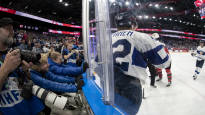Urheilu’s World Cup reporters Henri Pitkänen, Jussi Paasi and Pekka Aalto highlight the points of the tournament. The contribution of small puck countries saved a lot.
TAMPERE. How will the 2023 Ice Hockey World Cup tournament be remembered? Journalists of Urheilu Henri Pitkänen, Jussi Paasi and Pekka Aalto jumped into the World Cup bubble in Tampere for a couple of weeks and picked the most memorable things from the games for this article.
Henri Pitkänen: An unemployed man wrote a great story
1) New hairs for the Lions’ Fur: Jukka Jalonen the contract continues next season, but the spring process and continuation should be reviewed. Jalonen’s winning machine didn’t start at any point, and refreshing the familiar, experienced and, of course, a lot of winning body next season wouldn’t hurt. Perhaps the composition of the training should also be considered. Leijona seemed a bit overfed this time, and the NHL reinforcements did not fit the desired style of play as seamlessly as, for example, last year. Finland did not deserve any more.
2) Different realities: During the Games, the IIHF received criticism for the condition of the ice and the Ice Hockey Federation for many other issues. In the media, it has been stated that the hockey bosses have detached themselves from everyday reality in their arrogance, for example in terms of ticket pricing, and the Lions’ games have been taken away from the reach of ordinary fans. Secretary General of the Games Heikki Hietanen stated on the decision day that the media, on the other hand, sometimes lives in a different reality than what the real situation is. Maybe sometimes we’ll still be in the same dimension.
3) Life as part of hockey and vice versa: Latvia’s survival in the semi-finals saved the atmosphere of the final weekend. From everything, down to the president’s vents, you could feel how much the historic World Cup bronze meant. Petteri Nummelin was recruited in the fall as Latvia’s assistant coach, and the spring ended with an incredible bronze medal story. Germany coach Pekka Kangasalu was an unemployed man until November, but on Saturday he found himself in Germany’s changing room, bouncing and fanning furiously for a surprising final place. And gold wasn’t too far away. Great stories are part of the essence of sports.
Jussi Paasi: Latvians saved the medal games
The fall of the curtain of lions: Jukka Jalonen’s winning machine, which has been going almost from victory to victory since 2019, froze this time in the quarterfinals. It might even have been a good thing, because now the Ice Hockey Association is forced to look at the pain points and problems behind the Lions’ golden curtain. There are enough of them.
Fan culture: Latvians saved Tampere’s sleepy atmosphere. The corporate guests left and were replaced by thousands of true fans who lived the game with every cell. The roar was deafening, beautiful and touching.
Surprises: Germany and Latvia advancing to the top four and medals is the best thing that can happen to the tournament every spring. When even Switzerland looked like it could reach anywhere at the World Cup level, the balance of power has leveled off significantly. It’s a fantastic thing for everyone.
Pekka Aalto: The mood makers shone in Tampere
Gasoline for embers: At the Finnish games, the atmosphere was on average quiet, but the creators of the event were not caught off guard. The arena announcers, presenters, DJs, videographers, media cube and light operators and the rest of the crew did an excellent job of igniting the mood. Particularly successful is the camera rotating in the stands, which provides a live image of the cube. The boost to games built around Sandstorm worked.
Contribution of small countries: Germany and Latvia advanced to the medals, which strangely freshened up a bit of a stalemate. The rush of the Latvians saved the last weekend in Tampere. More broadly, the IIHF has persistently run 16 country tournaments. It has been smart, because the level seems to have really widened. Almost all World Cup countries were able to at least defend the center so that there were not too many crushing victories and walkovers in the early blocks.
Chains to lock: Jukka Jalonen has created a great recipe for success for Leijon, which was used to mature three championship wins in three years. That included locking down the lineup early. Chains and pack pairs were also given time to find a common note. Now the confidence turned to coldness. There were three games in the initial series to experiment, but the opportunity was missed.
